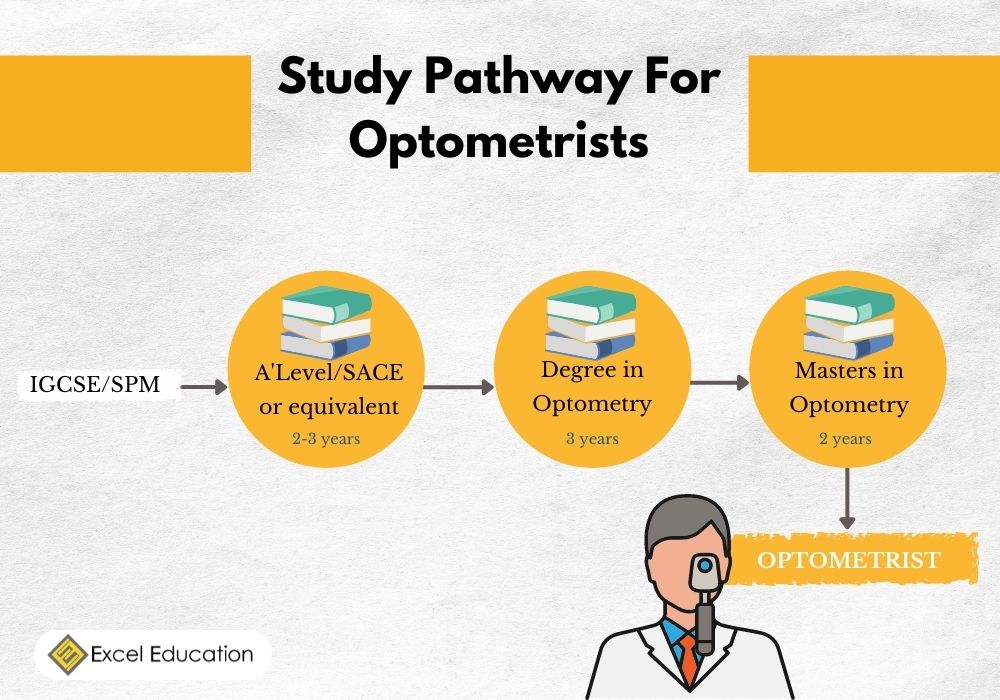
Our eyes are by far, the most important sensory organs in the human body. We perceive upto 80% of all impressions with the help of our eyes. Moreover, if other senses such as our taste, smell and hearing stop working, it is the eyes that can save us from danger.
We always hear people saying that the eyes are the window to your soul, but did you know that they are also the window to your health? The eyes give us signs about various health conditions we might have, such as high blood pressure, stress, diabetes and more.
For these reasons, protecting these valuable organs is of utter importance. If this is something that interests you, then optometry could be the field for you.
What is Optometry?
Optometry is all about examining the eyes for abnormalities and providing the necessary care and treatment to preserve or restore eyesight.
From correcting your eyesight issues by prescribing spectacle to identifying eye diseases such as glaucoma, optometrists provide various important services concerning the human eye.
Even though the job of an optometrist might seem similar to a doctor’s, they are, however, not doctors. What you may call an eye doctor on the other hand is an ophthalmologist. There is a vast difference between these two professions, which is briefly explained below.
Optometrists are trained to conduct thorough eye exams, diagnose vision disorders, and prescribe eyeglasses and contact lenses. They are also qualified to identify and diagnose eye diseases and other chronic health problems such as diabetes that the eyes can tell.
Ophthalmologists are medical doctors specialized in the field of eye care. Opthamologists have more complex expertise in the diagnosing and treating the eyes, including performing surgery.
Study Pathway to Become an Optometrist

Since you need a Masters in Optometry to become an optometrist some universities in Australia offer courses that combine Degrees and Masters in Optometry, so that you can register as an Optometrist straight after graduation.
What Will You Study in a Degree in Optometry/Vision Science?
In an Optometry course you will cover topics ranging from scientific principles that form the basis of optometry, the anatomy of the eyes to eye diseases, pharmacology and contact lense practice as well.
Listed below are some of the major subjects you will cover in an Optometry course;
- Human & Ocular Anatomy
- Ocular Diseases
- Geometrical & Physical Optics
- Optometric Instrumentation
- Optometric Pharmacology and Use of Drugs
- Behavioural Science in Vision Care
- Binocular Vision
- Contact Lens Practice
In addition to this, clinical placements are a major part of Optometry courses to provide students with the necessary practical skills that employers look for.
What are the Career Opportunities for an Optometry Graduate?
Upon completion of a Masters in Optometry, you will be able to register as an Optometrist in Australia.
There are a range of sectors that Optometry graduates can explore, such as;
- Hospitals and Clinics
- Private Optometric Practice
- Community Health Centres
- Opthalmic Product Manufacturers
What are the General Entry Requirements for a Degree in Optometry/Vision Science?
GCE A Levels | • Minimum 12 points in 3 subjects, including Chemistry, Math, Physics, where A*=6, A=5, B=4, C=3, D=2, E=1 |
Malaysian Matriculation | Point average 3.5 on a 4 point scale |
International Baccalaureate Diploma Program (IBDP) | • 42 |
ATAR | • 91.5 |
UEC | • 1.2, from 5 major subjects (excluding Chinese, Malay, PE); where A1=1; A2=2; B3=3; B4=4; B5=5; B6=6; C7=7; C8=8; F9=Fail |
*The requirements may vary among universities, for inquiries on other entry requirements, contact Excel Education.
What are the English Language Requirements for International Students?
IELTS | Overall 7, with no individual bands less than 6.5 |
TOEFL (Internet Based Test) | Overall 94 |
TOEFL (Paper Based Test) | 589 |
Pearson Test of English: | 65 |
*The requirements may vary among universities, for inquiries on other entry requirements, contact Excel Education.
Top 10 Universities to Study Optometry/Vision Science in Australia
University of New South Wales (UNSW)

UNSW’s Bachelor of Visions Science/Clinical Optometry is a double degree that combines the theoretical discipline of vision science with the clinical art of primary eye care. Upon successful completion of this program graduates have the chance to get registered as an optometrist in Australia, New Zealand and in most parts of Asia.
Course Details
Program | Bachelor of Vision Science/Master of Clinical Optometry |
Intake | February |
Duration | 5 Years (Full time) |
Indicative Fees | Contact Excel Education |
University of Canberra

University of Canberra’s Bachelor of Vision Science is accredited by the Optometry Council of Australia and New Zealand until April 2023. In order to become registered with the Optometry Board of Australia to practice as an optometrist however, you will also need to complete the Master of Optometry course at University of Canberra along with this program.
Please note that in order to get entry into the Masters of Optometry at University of Canberra, you have to complete the Bachelors of Vision Science Program from University of Canberra, and not any other university.
Course Details
Program | Bachelor of Vision Science |
Intake | February |
Duration | 3 Years (Full time) |
Indicative Fees | Contact Excel Education |
Queensland University of Technology (QUT)

QUT’s Bachelor of Vision Science is accredited by the Optometry Council of Australia and New Zealand. Upon successful completion of both Bachelor of Vision Science and Master of Optometry, you will be eligible for registration as an optometrist with the Optometry Board of Australia. With this course, you can also choose to travel and complete clinical training in rural and remote Australia, or overseas.
Course Details
Program | Bachelor of Vision Science |
Intake | February |
Duration | 3 Years (Full time) |
Indicative Fees | Contact Excel Education |
Deakin University

Deakin University’s Bachelor of Vision Science/ Master of Optometry is an accelerated undergraduate degree that allows students to graduate as qualified optometrists in just 3.5 years. This program is accredited by the Optometry Council of Australia and New Zealand (OCNZ). This course focuses on the visual health issues that impact rural and regional Australia. You will also be gaining relevant work experience through clinical placements.
Course Details
Program | Bachelor of Vision Science/ Master of Optometry |
Intake | March | July |
Duration | 3.5 Years (Accelerated full time) |
Indicative Fees | Contact Excel Education |
Flinders University

Flinders University’s Bachelor of Medical Science (Vision Science)/ Master of Optometry provides its students the knowledge to qualify as a registered optometrist upon successful completion of the program. This course is accredited by the Optometry Council of Australia and New Zealand. This program provides you practical experience that prepares you for employment, including complete urban and rural clinical placements in areas such as contact lenses or paediatric optometry.
Course Details
Program | Bachelor of Medical Science (Vision Science)/ Master of Optometry |
Intake | March |
Duration | 5 Years (Full time) |
Indicative Fees | Contact Excel Education |
About The Author

I like to keep it simple.


